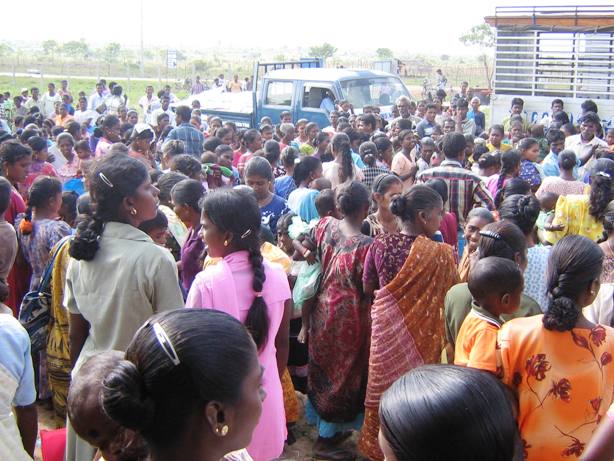The United Nations High Commission for Refugees (UNHCR) has pulled out of all refugee resettlement operations in Sri Lanka’s East after accusing the Government of forcibly resettling displaced Tamils in areas considered to be unsafe.
 |
| Tamil refugees are being forced onto busses taking them back into embattled areas. Photo TamilNet |
The move comes amid accusation that the Sri Lankan security forces are using Tamil civilians as human shields for artillery attacks and ground offensives against the Liberation Tigers.
Echoing protests by UNHCR, Human Rights Watch (HRW) also raised concerns last week over the reports of people being forcibly returned to their villages.
The Sri Lankan government has formally rejected the accusations and insists that all resettlement will be voluntary and the participation of UNHCR.
But Sri Lanka’s minister for Resettlement and Relief Services, Rishad Badurdeen admitted the government had forcibly moved displaced people.
He was quoted by local media as saying that around 10 per cent of the people were reportedly moved to a resettlement camp against their will.
The Sri Lankan military also confirmed forcible resettlement had taken place. Military spokesman Prasad Samarasinghe admitted to reporters that last week a group of people were transferred to UNHCR transit camp in Killivedi against their will.
And UNHCR Spokesperson Ron Redmond in Geneva referring to the Government assurances said ground reports suggest otherwise.
“Reports indicate that this [voluntary resettlement] has not been the case and we also are disturbed by statements attributed to local authorities that all assistance may be stopped if internally displaced people remain in Batticaloa and that the Government would not be able to guarantee their safety,” he said.
Meanwhile refugees living in camps in government-held Batticaloa told Reuters that Sri Lankan officials had threatened to halt food and water handouts if they did not agree to return to their homes in the embattled areas.
“According to one of the reports, women and children at one site were forced to board buses despite pleas that they couldn’t leave while their husbands were still at work and children at school,” Mr. Redomond said.
The UNHCR distanced itself from the Government’s actions by ceasing to participate in refugee resettlement operations in the East.
Amin Awad, head of UN refugee agency UNHCR in Sri Lanka announcing their decision to pull out of resettlement work in the East said "we are saying that we are not involved with this situation, we don't want to give the IDPs the impression that we are assisting or facilitating or promoting return,"
"The conditions in Vakarai are not right for resettlement and there is work to be done on services and minimum conditions for return,"
"We feel that the minimum conditions of security, demining, removal of UXOs (unexploded ordnance), need to be put in place and also food stocks and quantities of
relief items should be in place and some services like basic health."
The UN agency estimates that the government has returned approximately 10,000 people against their will to Vaharai north of Batticaloa town and Sampur south of Trincomalee where landmines have not been cleared and infrastructure has been destroyed due to fighting.
Government defense spokesman Keheliya Rambukwelle responding to allegations of forcible resettlement said “it is their right to be resettled in their original places. The government is fulfilling that right. If someone interprets it as forceful resettlement, well then that’s disappointing.”
“This whole journey is not a bed of roses. It’s a tough journey to deal with 100 – 150,000 people,” he argued.
“In the process you might have a few cases where some people don’t want to be resettled.”
